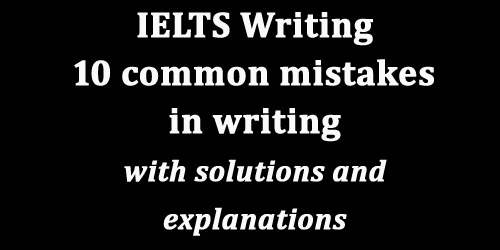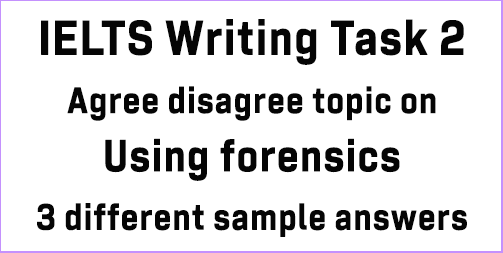IELTS Writing: 10 most common mistakes in writing; with top solutions and explanations
This IELTS Writing post deals with 10 most common mistakes that candidates do in the Writing module. Most often candidates make some silly mistakes in grammar and spelling for which their expected band cannot be achieved. This post is focused to help you all to correct these 10 silly mistakes with solutions and explanations. It will also be a good practice for you so that these mistakes do not happen often in your writing.

Let’s admit this. Mistakes happen, especially, when you are trying to learn a different language! It’s a very ordinary problem. Unfortunately, IELTS test takers do some silly mistakes sometimes which influence their score negatively. We must prevent our writings from such mistakes. Below is a list of ten such mistakes, their solutions, and explanations.
- Incorrect: This course is too good for us to learn English quickly.
Correct: This course is very good for us to learn English quickly.
Explanation: too……….to is used to describe something negative. It does not indicate anything positive. So, we should use very…….to in this case.
- Incorrect: The NGOs shouldn’t be worried about such problems.
Correct: The NGOs should not be worried about such problems.
Explanation: Contractions are generally spoken form of English and they are not used in any formal writing. As IELTS writing is just like any other formal writing, it is not expected from candidates to use contractions such as shouldn’t, couldn’t, wouldn’t, won’t, isn’t, aren’t, I’ve, We’d, They’ll etc. Rather, try to use should not, could not, would not, will not, is not, are not, I have, We would, They will etc.
- Incorrect: Our authority are not much concerned about it.
Correct: Our authority is not much concerned about it.
Incorrect: People does not agree with it.
Correct: People do not agree with it.
Incorrect: The captains of the team orders the players to follow their lead.
Correct: The captains of the team order the players to follow their lead.
Incorrect: The leader of the Labour Party urge all to make the last stand.
Correct: The leader of the Labour Party urges all to make the last stand.
Explanation: This is commonly known as ‘subject-verb agreement’. In present indefinite tense, two forms of verbs are used in sentences according to their subject. If the subject is a third person singular number, we use is, has, does etc. we also use main verbs with an s/es with it. The opposite method is used for a third person plural number. This is where many students lose marks easily.
- Incorrect: My personal opinion, in this case, is that we should be conscious of the given facts and also try to minimize the production-time pollution.
Correct: My personal opinion, in this case, is that we should be conscious of the given facts and try to minimize the production-time pollution.
Or, My personal opinion, in this case, is that we should be conscious of the given facts. We can also try to minimize the production-time pollution.
Explanation: Also delivers the same meaning as and. It is, therefore, not expected that you should write them together. It might sound right, but it isn’t. Generally, this mistake comes to writing because we use this wrong phrase and also in spoken English. So, try to avoid it in both modules.
- Incorrect: Each and every person should be held responsible.
Correct: Each person should be held responsible.
Or, Every person should be held responsible.
Explanation: We need to use one or the other. Using both the words each and every carries no value. Rather, it may confuse the examiner.
- Incorrect: All the girl’s / girls’ look beautiful. (Unnecessary use)
Correct: All the girls look beautiful.
Incorrect: This is Jenifers’ book. (Misplaced use)
Correct: This is Jenifer’s book.
Explanation: These grammatical mistakes are commonly known as ‘Unnecessary apostrophes’ or ‘misplaced apostrophes’. You should learn well where to use apostrophes and use them appropriately in the test. For example: we use an apostrophe just after the subject if it is third person singular number – Jenifer’s. However, we do not use an apostrophe if it does not mean possession or ownership of anything.
- Incorrect: On the other hand we have to stop using electricity when it is not needed.
Correct: On the other hand, we have to stop using electricity when it is not needed.
Explanation: This is a mistake found by IELTS examiners which candidates do when they are in a rush. You must remember to use a comma (,) just after using a discourse marker. A discourse marker is a group of words or a phrase which links the ideas of the writer together. Here are some common discourse markers: on the one hand, on the other hand, for example, firstly, secondly, nevertheless, however, in conclusion, in summary.
- Incorrect: They were pleased about me.
Correct: They were pleased with me. (pleased with someone)
Incorrect: The company was pleased with the assignment.
Correct: The company was pleased about the assignment. (pleased about something)
Explanation: Candidates often confuse themselves about which prepositions to write after adjectives and nouns. These may give a wrong meaning to the sentence.
- Incorrect: She takes few rice.
Correct: She takes less rice.
Explanation: A common mistake is to use the wrong quantifiers. We need to remember that ‘less’ is used with uncountable nouns whereas ‘few’ is used with countable nouns. You can say, “Fewer people were present there.” You cannot say, “Less people were present there.” So, pay attention to the usage of countable and uncountable nouns. One other example of the same sort:
Incorrect: The amount of boys decreased over the period.
Correct: The number of boys decreased over the period.
- Incorrect: The devastating flood of Kerala effected a lot of people.
Correct: The devastating flood of Kerala affected a lot of people.
Incorrect: The affects of globalization are now visible.
Correct: The effects of globalization are now visible.
Explanation: Many IELTS candidates have this odd idea that these two words are the same, but they are not! Effect is noun while affect is a verb.
If you like the post, or if you want to know more about such mistakes, please make comments below.




Hey loved the post there are 4-5 mistakes i made in my earler attempt,
can you provide correction Services
Sure, just let me know how you would like it!